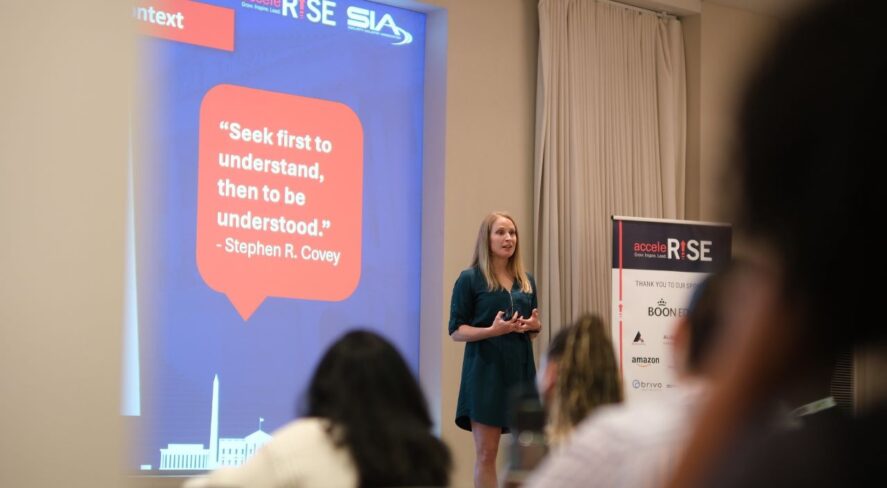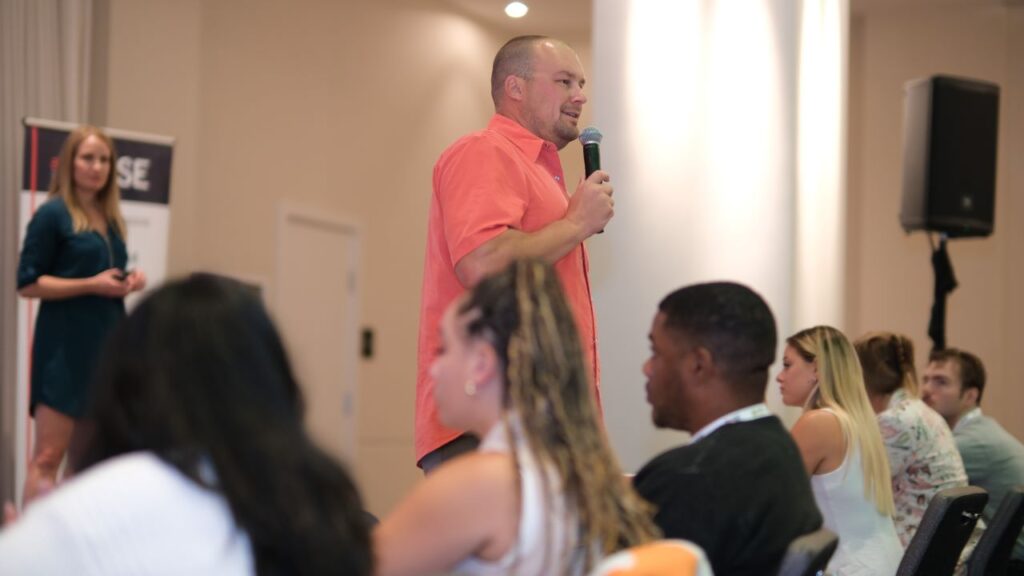The Influence Insider’s Playbook: Mastering the Art of Influence

At AcceleRISE 2024, Kelly DeLeo and Colin DePree shared the inside scoop on mastering influence in the workplace.
The Security Industry Association (SIA) recently closed out a successful sixth annual AcceleRISE – a unique event presented by the SIA RISE community and gathering tomorrow’s security leaders. The sold-out event took place Aug. 12-14, 2024, in Washington, D.C., and offered attendees meaningful opportunities to connect, take their careers to the next level, explore the nation’s capital and have fun.
AcceleRISE 2024 – a three-day program featuring industry-leading subject matter experts and emerging security leaders – offered inspiring talks and panel discussions, interactive workshops and lively activities on a variety of topics in leadership, career development, technology, fostering the future of the security industry and more. One highlight was a session on mastering the art of influencing without authority from Kelly DeLeo, director of service and solutions at Axis Communications, and Colin DePree, sales strategy at Salto Systems.
What is influence?
“No one is 100% in control of their job and the outcomes of their job,” said DeLeo, who shared the definition of influence as the capacity to have an effect on the character, development or behavior of someone or something or the effect itself. Influencing is important, said DeLeo and DePree, because it helps people in:
- Achieving their goals
- Leadership
- Collaboration
- Problem solving
- Career advancement
- Negotiation
- Building relationships
- Adapting to change

How do we influence?
DeLeo and DePree outlined the primary influencing styles:
- Asserting: Advocating by debate, insisting your ideas are heard and challenging the ideas of others
- Rationalizing: Advocating by offering logic, rational reasons and data
- Negotiating: Advocating through compromises, concessions and tradeoffs to reach outcomes
- Bridging: Advocating by connecting and building relationships and coalitions
- Inspiring: Advocating by presenting a sense of shared purpose and exciting possibilities
Each style has advantages and may be preferred in different situations (for example, asserting is effective for those in a position of authority or in a time crunch, whereas inspiring is good for a long-term or ambitious goal, and negotiating should be used sparingly and when other options have been exhausted).
How do we cultivate our power?
DeLeo explored the concept of power, or the capacity to exert influence, and outlined two types of power:
- Positional power is based on title – someone’s formal status, authority, control of resources, punishments or rewards. When effectively used, it builds respect, and when ineffectively used, it creates fear.
- Personal power is based on reputation – someone’s expertise, special skills, personality traits, charisma, personal status or credibility. When effectively used, it builds confidence and trust, and when ineffectively used, it creates competition.
“When we have positional power but no personal power, we may still exercise authority or power,” said DeLeo, “but when we have no positional power, it is personal power that helps us be heard.”
DeLeo and DePree shared three key elements of personal power – character, communication and confidence – and urged attendees to hone those elements in themselves in order to exude personal power.
- Character is built on trust, reputation and curiosity. “Trust is foundational for influence,” said DePree. “If you can’t exude trust and show you’re a trustworthy individual, there will be zero personal power.” To hone trust, one should follow through on their commitments and not be part of the gossip mill. Reputation is “your personal brand,” said DePree. “Can people come to you and know they can get an honest perspective? Don’t mistake this [just] for being well liked – respectfully challenge others.” Finally, DePree encouraged people to be curious and always ask lots of questions.
- Communication is built on empathy, listening and understanding. DePree encouraged people to hear people out, to “listen to learn versus listening to respond” and to “understand first, influence second.”
- Confidence is “a mindset – not just about winning,” said DePree. Confident people celebrate each other’s successes, are open minded, are optimistic, are willing to take risks, laugh at themselves, are decisive, are always learning and growing, admit their mistakes and accept responsibility, whereas insecure people judge and are jealous of others, are closed minded, are pessimistic, are afraid of change, hide their flaws, are indecisive, act like know-it-alls, make excuses and blame others. DePree encouraged attendees to be vulnerable and confident but not cocky. “The courage to speak up starts with a whisper, and then opportunities present themselves,” he said.

What are the qualities of an effective influencer?
The secret to having influence, DeLeo and DePree highlighted, was to exhibit four key influencing patterns:
- Context: Cultivate curiosity by knowing your audience, people and environment and understanding they have as much to change in you as you do in them. Work to understand what frustrates and motivates others, break your own assumptions and ask hard questions. Give others your full attention, remember you don’t need to respond, ask lots of questions, be open to whatever path the conversation takes and listen to learn, not to respond.
- Breadth: Cultivate and build bridges. See how the pieces fit together into a bigger story. Build coalitions at the seams, see the organization as a whole, build bridges between people and help find common ground.
- Choice: Cultivate choice by understanding your prioritization framework – the why, how and what. Understand why you are doing something and consider whether it will help achieve your mission. Have a customer focus and consider who will benefit from something.
- Connection: Cultivate empathy by being someone people want to be around and respect, building trusting relationships and finding the joy in and wanting to help others succeed.
How do you know you’ve influenced effectively?
DeLeo and DePree closed out the session with indicators that you have succeeded in influencing effectively:
- You’re adept at getting your opinions and ideas heard, recognized and considered by others.
- You have increased trust, support and ownership for your priorities.
- You have the capacity to influence those around you toward acceptance of beneficial outcomes.
“Influencing is not about dictating an outcome – it’s about guiding and steering in a direction,” said DePree.
SIA RISE is a community that fosters the careers of emerging leaders in the security industry. In addition to the SIA RISE Scholarship, SIA RISE offers fun in-person and virtual networking events for young professionals, the Talent Inclusion Mentorship Education (TIME) program for early and mid-career professionals, the 25 on the RISE Awards, career growth webinars and trade show education tracks and the annual AcceleRISE conference – a unique event designed to ignite new thinking, strengthen leadership and sharpen business acumen in young security talent. The SIA RISE community is open to all employees at SIA member companies who are young professionals under 40 or have been in the security industry for less than two years; learn more and sign up to join.
See photos from AcceleRISE here. Plans are underway for next year’s AcceleRISE conference. To learn more and stay up to date, visit https://accelerise.securityindustry.org/.
